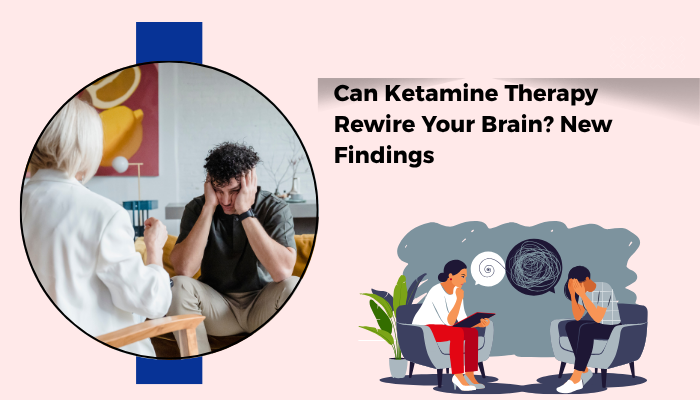If you’ve been following the latest developments in mental health treatment, you’ve probably heard about ketamine therapy. What used to be a surgical anesthetic is now emerging as one of the most promising options for treating depression, PTSD, and other mental health conditions, especially in individuals who haven’t responded to traditional medications. But can ketamine therapy actually rewire your brain? And what does that mean for long-term healing?
In this article, we’ll explore the science, the real-world impact, and what the latest findings reveal, especially for those considering ketamine therapy in Pennsylvania, where access is expanding rapidly. Let’s break it down in a human, relatable way.
Understanding Ketamine Therapy: The Basics
Ketamine therapy involves the medically supervised use of ketamine, often delivered via IV infusion, nasal spray, or lozenges, to treat mental health conditions. Originally approved as an anesthetic in the 1970s, ketamine is now being studied and used for its rapid-acting antidepressant effects.
Unlike SSRIs (like Prozac or Zoloft), which work by increasing serotonin levels and often take weeks to show benefits, ketamine acts within hours in many cases. That’s one of the reasons it’s so revolutionary.
People struggling with:
- Treatment-resistant depression
- PTSD
- Anxiety disorders
- Chronic pain
- Suicidal ideation
…are now finding relief through this novel approach, some for the first time in years.
How Ketamine Affects the Brain
So, can ketamine really rewire the brain?
In a way—yes.
Research has shown that ketamine promotes neuroplasticity, which is the brain’s ability to form new connections and repair old ones. When depression takes hold, it often disrupts communication between key areas of the brain, like the prefrontal cortex and hippocampus. These disruptions make it harder to process emotions, regulate mood, or think clearly.
Ketamine stimulates the release of glutamate, a neurotransmitter that activates a growth factor called BDNF (brain-derived neurotrophic factor). BDNF helps repair neural pathways and encourages new ones to form.
Think of it this way: If your brain is a tangled web of damaged circuits, ketamine therapy helps reconnect the wires. It’s not a magic fix, but it clears the fog, so to speak.
What the Latest Research Says
Let’s look at some recent data.
A 2024 meta-analysis published in the Journal of Neuropsychiatry and Clinical Neurosciences reviewed over 30 clinical trials and found that 71% of patients with treatment-resistant depression showed significant improvement within one week of starting ketamine therapy.
Another 2025 study conducted by the University of Pennsylvania Medical Center found measurable changes in brain connectivity after just two sessions of ketamine therapy, using fMRI scans to track neural activity.
The results? Stronger communication between emotion-processing regions of the brain—and decreased activity in areas associated with fear and stress.
What does this mean for people in Pennsylvania? With more clinics opening and wider provider access, residents are at the forefront of a mental health breakthrough.
What a Typical Ketamine Session Looks Like
A lot of people worry about what the experience feels like. Here’s a snapshot:
- Before your first session, you’ll go through a medical and psychological evaluation.
- On treatment day, you’re in a comfortable room with medical supervision. Some clinics play soft music or offer eye masks to help you relax.
- During the session, which typically lasts 40-60 minutes, patients report feeling detached from their usual thoughts, sometimes experiencing vivid imagery or emotional releases.
- Afterward, you’ll have a debrief or integration session to help process anything that came up.
It’s not about “getting high.” It’s about opening a window into your mind, safely, and with support.
Why Ketamine Therapy Is Growing in Pennsylvania
In places like Philadelphia, Pittsburgh, and Harrisburg, ketamine therapy Pennsylvania clinics are gaining momentum. Why?
- Increasing demand for non-traditional treatments
- Expanding clinical support and provider networks
- State-level mental health initiatives focusing on innovative care
For example, in 2025, the Pennsylvania Department of Health launched a pilot program funding access to ketamine therapy for veterans and low-income individuals with treatment-resistant depression. It’s just one example of how the state is leaning into evidence-based alternative care.
Real People. Real Results.
Meet Jason, a 42-year-old father of two from Scranton. He struggled with depression for over a decade and had tried more than six different antidepressants.
“I honestly didn’t think anything would help me,” he shared. “But after just two ketamine sessions, I felt like I could breathe again. My thoughts weren’t spiraling. I could actually enjoy a day with my kids without this cloud hanging over me.”
Jason’s story isn’t unusual. And while ketamine isn’t a miracle cure, it offers something many haven’t felt in years: hope.
Is Ketamine Therapy Right for You?
Like any treatment, ketamine therapy isn’t for everyone. It’s not recommended for those with:
- A history of schizophrenia or psychosis
- Uncontrolled high blood pressure
- Certain heart conditions
That’s why the screening process is so important. But for many, especially those who’ve exhausted traditional options, it’s a lifeline.
And thanks to the growing availability of ketamine therapy in Pennsylvania, access is no longer as limited as it once was.
If you’re considering this route, here are a few questions to bring to your provider:
What to Ask Before Starting
- What kind of ketamine administration do you use (IV, IM, oral, nasal)?
- How many sessions are typical?
- Is therapy included with the treatment?
- What safety protocols are in place?
- How will we measure progress?
These questions help ensure that you’re receiving care that’s not just cutting-edge, but also compassionate and personalized.
Final Thoughts
We’ve entered a new chapter in how we approach mental wellness, one where we’re finally looking beyond the same old medications and into therapies that treat the brain in entirely new ways.
Ketamine therapy is opening that door for many people. It’s not about chasing a psychedelic experience. It’s about quieting the noise, reconnecting with yourself, and making space for healing.
And for those in the Keystone State? The opportunities are growing fast. With trusted providers, rigorous protocols, and ongoing research, ketamine therapy Pennsylvania is helping to redefine what’s possible for those who thought healing was out of reach.
Click – propernewstime.com



